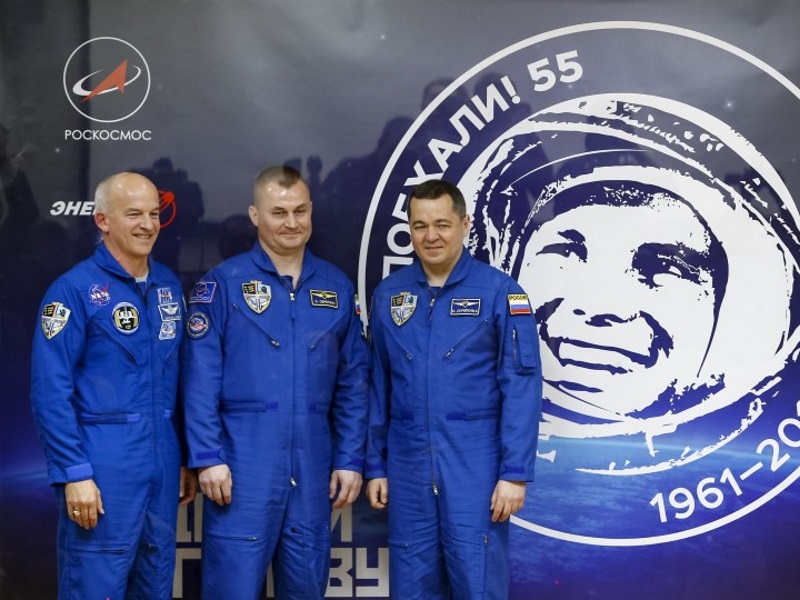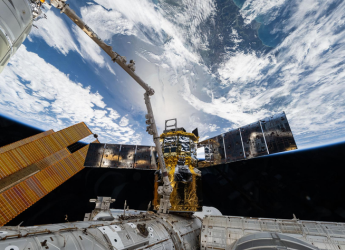- Home
- Science
- Science News
- Russian Spacecraft With US Grandpa Onboard Docks at Space Station
Russian Spacecraft With US Grandpa Onboard Docks at Space Station

The crew docked at 0309 GMT Saturday some 407 kilometers (253 miles) above the Pacific Ocean, off the western coast of Peru, according to the American space agency.
The rocket took off in windy conditions from Russia's space base in Kazakhstan at 2126 GMT, an AFP reporter saw.
According to Nasa, it orbited the earth four times in its approximately six-hour journey.
"Spacecraft carrying crew successfully docks to @Space_Station," Nasa posted on Twitter.
The trio on board comprise Russians Oleg Skriprochka and Alexey Ovchinin, and US grandfather of three, Jeff Williams, a veteran of long-duration space missions.
The craft is decorated with a portrait of the first man in space, Soviet hero Yuri Gagarin, whose pioneering orbital flight was made nearly 55 years ago, on April 12 1961.
By the end of his half-year trip aboard the ISS, Williams "will become the American with the most cumulative days in space 534," Nasa says.
The previous US record was set by astronaut Scott Kelly earlier this year.
Kelly, 52, spent nearly a year in space and returned to Earth earlier this month with a total of 520 days in space, as part of an experiment to test the effects of long-duration spaceflight on the body and mind ahead of a potential future mission to Mars.
The all-time record for cumulative days spent in space is held by Russian cosmonaut Gennady Padalka, who racked up 879 days over his career and wrapped up his final mission in September 2015.
Williams has so far notched up over 362 days in space, including three spacewalks.
His previous missions were flown aboard the space shuttle Atlantis in 2000, as well as a trip in 2006 when the station was far smaller with only two modules and three crew members.
In 2009 and 2010, Williams served as a flight engineer for three months and later commanded the ISS for the remainder of his half-year mission.
Williams, Skripochka and Ovchinin will join US astronaut Tim Kopra, Russian cosmonaut Yuri Malenchenko and the European Space Agency's British astronaut Tim Peake at the ISS to continue Expedition 47.
The ISS has been orbiting the Earth at roughly 28,000 kilometres (17,400 miles) per hour since 1998 and has been continuously occupied since the first expedition in November 2000.
Space is one of few areas of cooperation between Moscow and the West that has not been disrupted by tensions connected to violence and separatism in Ukraine.
For details of the latest launches and news from Samsung, Xiaomi, Realme, OnePlus, Oppo and other companies at the Mobile World Congress in Barcelona, visit our MWC 2026 hub.
- Samsung Galaxy Unpacked 2026
- iPhone 17 Pro Max
- ChatGPT
- iOS 26
- Laptop Under 50000
- Smartwatch Under 10000
- Apple Vision Pro
- Oneplus 12
- OnePlus Nord CE 3 Lite 5G
- iPhone 13
- Xiaomi 14 Pro
- Oppo Find N3
- Tecno Spark Go (2023)
- Realme V30
- Best Phones Under 25000
- Samsung Galaxy S24 Series
- Cryptocurrency
- iQoo 12
- Samsung Galaxy S24 Ultra
- Giottus
- Samsung Galaxy Z Flip 5
- Apple 'Scary Fast'
- Housefull 5
- GoPro Hero 12 Black Review
- Invincible Season 2
- JioGlass
- HD Ready TV
- Latest Mobile Phones
- Compare Phones
- Nothing Phone 4a Pro
- Infinix Note 60 Ultra
- Nothing Phone 4a
- Honor 600 Lite
- Nubia Neo 5 GT
- Realme Narzo Power 5G
- Vivo X300 FE
- Tecno Pop X
- MacBook Neo
- MacBook Pro 16-Inch (M5 Max, 2026)
- Tecno Megapad 2
- Apple iPad Air 13-Inch (2026) Wi-Fi + Cellular
- Tecno Watch GT 1S
- Huawei Watch GT Runner 2
- Xiaomi QLED TV X Pro 75
- Haier H5E Series
- Asus ROG Ally
- Nintendo Switch Lite
- Haier 1.6 Ton 5 Star Inverter Split AC (HSU19G-MZAID5BN-INV)
- Haier 1.6 Ton 5 Star Inverter Split AC (HSU19G-MZAIM5BN-INV)












